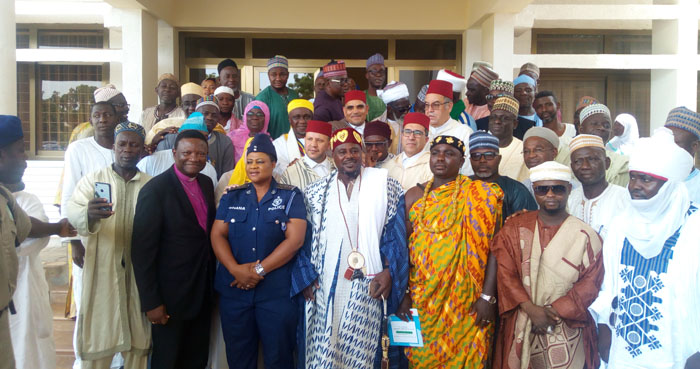Dignitaries at the launch
The Chairman of the National Peace Council, Reverend Prof Emmanuel Asante, has advised religious leaders to desist from undermining and violating the rights of other citizens while practising their faiths.
But they should rather promote national tolerance, cohesion and development.
He commended the Muslim community in the country for their sense of maturity so far in handling thorny issues such as the wearing of hijab in schools through dialogue as against violence.
“I want to say a big congratulation to the Muslim community, for that issue did not spark off religious conflict,” he said.
Prof Asante was speaking to a congregation of Muslim clergy during the inauguration of the Ghana Branch of King Mohammed VI Foundation for African Oulema (Islamic scholars) held in Accra.
The inaugural ceremony which marked the beginning of a two-day symposium for knowledge exchange between Muslim scholars of Ghana and Morocco was held under the theme: “Relying on Common Grounds to Promote Values of Peace and Tolerance”.
The foundation which currently operates in 32 African countries was started in June 2013 with the aim of harnessing efforts of Muslim scholars on the African continent to promote peace and tolerance among humanity.
A Senior Lecturer at the University of Ghana, Dr Rabiatu Armah, said that Islam as a primordial religion thrives on seeking knowledge, peace and exemplification of tolerance through non-aggression and respect for other people’s religious ideologies.
“There is no compulsion in religion and for that matter we must allow people who are not of our faith to practise what they know is right,” she said.
Dr Armah also warned against religious sectarianism as a proponent of disunity and igniting intra religious aggression which has become the most common cause of religious conflict in the world.
The Moroccan Ambassador to Ghana, Mohamed Farahat, said the inauguration of the branch serves as a new pillar of bilateral relations between both countries.
Beyond its purpose of religious enlightenment, he said the foundation seeks to address pressing social issues especially among the Muslim youth through education and the promotion of good governance practice within the tenets of Islamic religion.
He encouraged Ghanaian scholars to provide the necessary cooperation to counterparts from other countries so as to have a unity of purpose and mutually beneficial exchanges.
Some key personalities present at the ceremony were the Minister of State at the Office of the Vice-President Abubakar Sadick Boniface, who launched the foundation.
Also present was the National Chief Imam who was accompanied by the National President of the Council of Zongo Chiefs, Alhaji Abdul Kadir Tahir. Besides, there were Islamic scholars from Kumasi at the function.
By Issah Mohammed

